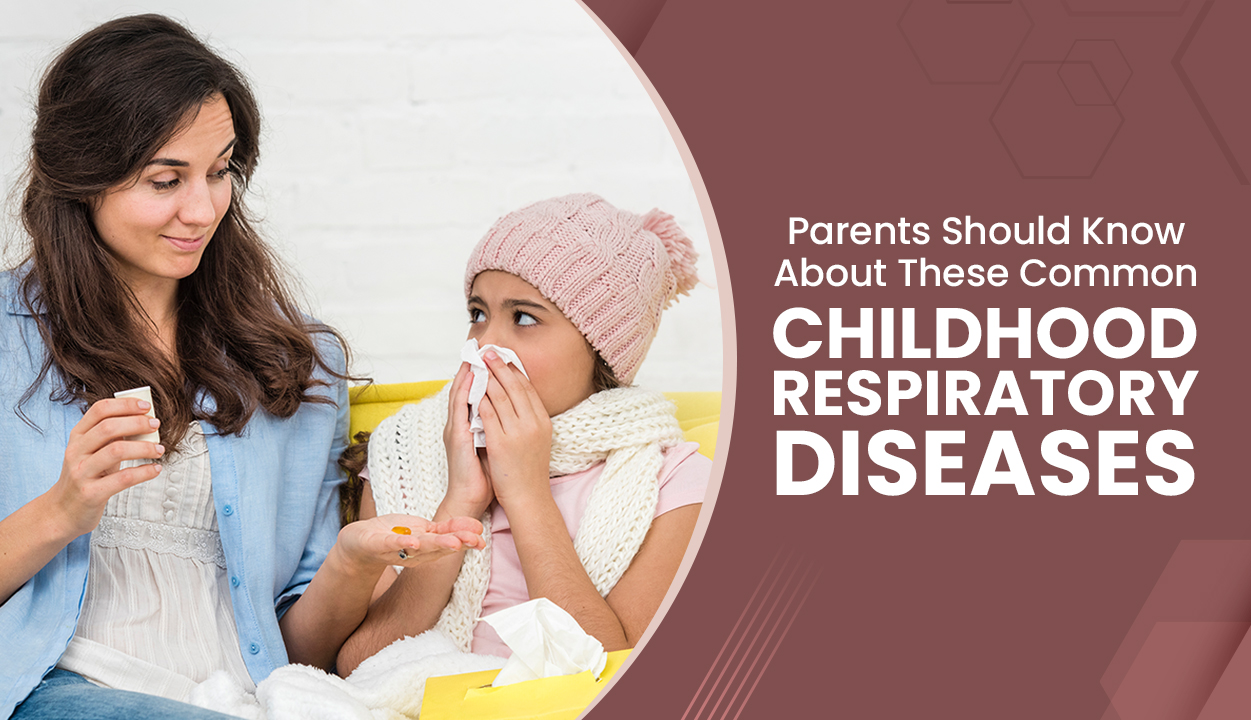
Parents Should Know About These Common Childhood Respiratory Diseases!
Childhood illnesses, especially those affecting breathing, can leave parents worried and helpless. While some common childhood respiratory diseases are inevitable, understanding them and practicing prevention measures can significantly reduce their impact.
Here’s a deeper dive into the most common respiratory infections in kids, along with prevention tips and practical care approaches:
- The Common Cold: Runny nose, cough, sore throat – it’s practically a rite of passage. Most colds are viral and require patience and TLC, not antibiotics. Plenty of fluids, rest, and a humidifier can ease discomfort. Remember, most colds resolve within a week or two.
- Bronchiolitis: This affects mainly infants and young children, causing wheezing and difficulty breathing. While most cases are mild, monitor your child closely.
- Pneumonia: Pneumonia in kids leads to inflammation of the lungs. It can be caused by viruses, bacteria, or even fungi. Symptoms of pneumonia in kids include fever, cough, rapid breathing, and chest pain. Early diagnosis and treatment are crucial, so don’t hesitate to see a doctor.
- Asthma: Asthma affects millions of children. Asthma in children is characterized by wheezing, coughing, and chest tightness. Triggers like allergens, dust mites, and exercise can cause severe flare-ups of asthma in children.
- Croup: This viral infection causes a barking cough and hoarse voice, mainly affecting younger children. While usually mild, monitor breathing and seek medical attention if symptoms worsen.
- Sinusitis: When the sinuses get inflamed, it’s painful! Facial pressure, congestion, drainage down the back of the throat, headaches are common symptoms of sinusitis.
Prevention is Always the Best Medicine:
The risk of common respiratory infections in kids can be minimized with:-
Vaccinations: This is your child’s first line of defense against preventable respiratory illnesses like influenza, pneumococcal disease, and measles. Follow the recommended immunization schedule and seek timely boosters.
Hand Hygiene: Teach your child to wash hands frequently with soap and water for at least 20 seconds, especially after using the restroom, playing outside, or being around someone sick. Consider carrying hand sanitizer for situations where handwashing isn’t readily available.
Healthy Habits: Encourage a balanced diet, adequate sleep, and regular physical activity. These strengthen the immune system and make children less susceptible to infections.
Minimize Allergens: If your child has allergies, identify and reduce exposure to triggers like dust mites, pollen, and pet dander. Regularly wash bedding, use air purifiers, and limit pets to specific areas.
Limit Sick Contact: Teach children to avoid close contact with anyone exhibiting signs of illness like coughing, sneezing, or a fever. Parents should consider keeping their children home from school or daycare if they show similar symptoms.
Additional Tips:
Young kids have lower immunity and are thus vulnerable to sicknesses. But with a few important points in mind, common respiratory infections in kids should not cause much stress for the parents too:-
- Stock Up on Essentials: Have a thermometer, saline nasal spray, a cool-mist humidifier, and age-appropriate over-the-counter medications on hand, just in case.
- Monitor Symptoms Closely: Watch for changes in breathing, fever, difficulty sleeping, or decreased appetite. Trust your gut, and don’t hesitate to seek professional help if needed.
- Stay Calm and Connected: Remember, most childhood respiratory diseases resolve on their own with proper care. Stay calm, reassure your child, and connect with your doctor or pediatrician for guidance and support.
By prioritizing prevention, understanding symptoms, and knowing how to respond, you can navigate common childhood respiratory diseases with confidence and help your little one breathe easily.
Also remember that a proper consultation with the doctor is mandated if any of the symptoms of these common respiratory infections in kids worsen. For more guidance, you can book an appointment with our doctor expert. Click here: http://182.79.136.75:62/ to schedule your appointment.
